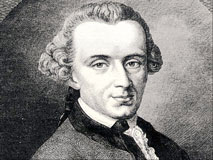 |
| Immanuel Kant, Age of Enlightenment brainiac. |
I find the conflict between faith and reason fascinating even if faith is used to support the existence of God. Attempting to justify faith unsupported by reason simply to have a cosmology that includes a "creator" is, to me, silly, or at least tortured.
I'm okay without God. Still, proving the existence of free will -- and thus the existence of moral responsibility -- has been a bridge too far for many who wax philosophical. How Kant handled it was illuminating, to an extent. It led to his testing the limits of reason, which physicist Niels Bohr ran up against in his explorations into quantum mechanics. What follows is from a paper called "Paradoxes of Free Will and the Limits of Human Reason":
Another kind of paradox presents two paired propositions, either of which, when considered alone, is supported by apparently sound arguments. But when the paired propositions are considered together, they turn out to be mutually contradictory.
...
If mental processes, including willing, were ordinary bodily functions, a view that came to be known as monism, they would be ruled by the forces of determinism, and there could be no such thing as freedom of the will. But if mental phenomena were more than, or basically different from, ordinary bodily functions, a view that came to be known as dualism, some mental processes, especially willing, might not be governed by determinism. In that case, the will could enjoy the freedom required for the resolution of the Paradox of Moral Responsibility.
...
One of the most troublesome paradoxes regarding the human condition arises from our intuitive belief that persons are morally responsible, i.e., that they can be judged as praiseworthy or blameworthy for the will that motivates their actions.
One criterion that is generally considered necessary and sufficient for holding a person morally responsible for an action is that the person freely willed to undertake that action.
...
We construct the noumena* of the natural/amoral realm of the intelligible world by use of that part of our pure reason that Kant designated as ‘pure theoretical reason’. (As used by Kant, the adjective ‘theoretical’ denotes the concern of pure reason with the difference between truth and falsehood.) For the construction of the noumena of the natural/amoral realm, pure theoretical reason resorts to amoral (that is, value-free), natural categories, such as space, time, and causality.
We construct the noumena of the non-natural/moral realm of the intelligible world by use of that other part of our pure reason that Kant designated as ‘pure practical reason’. (As used by Kant, the adjective ‘practical’ denotes a concern of pure reason with moral decisions.) For the construction of the noumena of the non-natural/moral realm, pure*noumenon: a posited object or event that exists without sense or perception. The thing itself. (plural -- noumena)
practical reason resorts to value-laden, non-natural/moral categories, such as good and evil, sacredness, and Free Will. The noumena of the non-natural/moral realm are human subjects, or persons.
Thus Kant separated the natural world from the moral world, creating a dualism, to posit that in the amoral sphere natural law applies, precluding free will. But in his non-natural/moral world, free will thrived, thus allowing for Moral Responsibility.
BTW, Niels Bohr ran into this paradox when he realized that in one observational set, an electron behaved like a wave, and in another observational set, the electron behaved like a particle. In order to deal with this hitch in the giddy-up of quantum mechanics, Bohrs needed his own dualism in seeming contradiction.
I hope you understand I'm doing this exercise strictly to feel secure in saying that everything is Trump's fault!
Ending on a serious note: Kant's solution strikes me as irrational, and I assume academics are in agreement. Let me know if I'm wrong. I always feel like I'm missing something! I willingly accept my capricious statement in my title: I moralize, therefore I am.
And it has to be noted that religious zealots have an easier bridge to cross: God gave us a free will so we could be tested, and moralizing is, for them, as easy as falling off a bicycle (or am I mixing up my similes?). Conservatives frame their world view with the authoritarian father model, so judging comes naturally to them. Fuckers!

No comments:
Post a Comment